Better Barriers Can Help Levees Withstand Wave Erosion (11/07/2010)
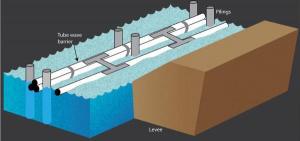 A new barrier design could protect reservoir levees from the erosive forces of wind-driven waves, according to studies by Agricultural Research Service (ARS) scientists and partners. These findings could help lower the maintenance costs for constructed ponds in the lower Mississippi Delta where levee repairs can average $3 per foot-and sometimes are needed just five years after a reservoir is built.
A new barrier design could protect reservoir levees from the erosive forces of wind-driven waves, according to studies by Agricultural Research Service (ARS) scientists and partners. These findings could help lower the maintenance costs for constructed ponds in the lower Mississippi Delta where levee repairs can average $3 per foot-and sometimes are needed just five years after a reservoir is built.
Black hole blows huge gas bubble (09/07/2010)
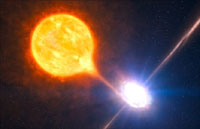 A small black hole has been observed blowing a vast bubble of hot gas 1,000 light-years across.
A small black hole has been observed blowing a vast bubble of hot gas 1,000 light-years across.
The gas is expanding because it is being heated by powerful particle "jets" being released by the black hole.
The observations were made by the Very Large Telescope in
Astronomers have unveiled the findings in the latest edition of Nature journal.
Brain's Energy Restored During Sleep (09/07/2010)
 In the initial stages of sleep, energy levels increase dramatically in brain regions found to be active during waking hours, according to new research in the June 30 issue of the Journal of Neuroscience. These results suggest that a surge of cellular energy may replenish brain processes needed to function normally while awake.
In the initial stages of sleep, energy levels increase dramatically in brain regions found to be active during waking hours, according to new research in the June 30 issue of the Journal of Neuroscience. These results suggest that a surge of cellular energy may replenish brain processes needed to function normally while awake.
'Quantum Computer' a Stage Closer With Silicon Breakthrough (24/06/2010)
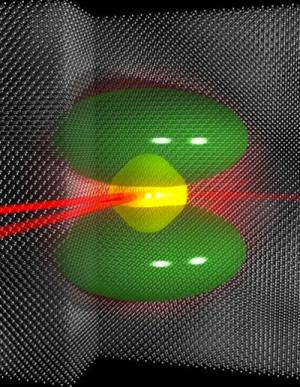 The remarkable ability of an electron to exist in two places at once has been controlled in the most common electronic material -- silicon -- for the first time. The research findings -- published in Nature by a UK-Dutch team from the University of Surrey, UCL (University College) London, Heriot-Watt University in Edinburgh, and the FOM Institute for Plasma Physics near Utrecht -- marks a significant step towards the making of an affordable "quantum computer."
The remarkable ability of an electron to exist in two places at once has been controlled in the most common electronic material -- silicon -- for the first time. The research findings -- published in Nature by a UK-Dutch team from the University of Surrey, UCL (University College) London, Heriot-Watt University in Edinburgh, and the FOM Institute for Plasma Physics near Utrecht -- marks a significant step towards the making of an affordable "quantum computer."
Astronomers Witness a Star Being Born (18/06/2010)
Astronomers have glimpsed what could be the youngest known star at the very moment it is being born. Not yet fully developed into a true star, the object is in the earliest stages of star formation and has just begun pulling in matter from a surrounding envelope of gas and dust, according to a new study that appears in the current issue of the Astrophysical Journal.
Tea and coffee 'protect against heart disease' (18/06/2010)
 Drinking several cups of tea or coffee a day appears to protect against heart disease, a 13-year-long study from the
Drinking several cups of tea or coffee a day appears to protect against heart disease, a 13-year-long study from the
It adds to a growing body of evidence suggesting health benefits from the most popular hot drinks.
Those who drank more than six cups of tea a day cut their risk of heart disease by a third, the study of 40,000 people found.
FCC to toughen internet rules (18/06/2010)
 The stage has been set for what many predict will be an ugly fight over broadband plans for US citizens.
The stage has been set for what many predict will be an ugly fight over broadband plans for US citizens.
The Federal Communications Commission has taken the first formal steps towards tougher rules for broadband.
It asked for public comment on three different plans, igniting an expensive lobbying campaign by all sides.
The looming battle follows a court ruling questioning the FCC's right to regulate internet service providers after one throttled traffic to users.
That court ruling dealt a major blow to a central plank of the FCC's broadband plan called net neutrality which demands that all data traffic be treated equally.
Wet past for red planet (18/06/2010)
Researchers say equal elevation of dry valleys and river deltas points to an ancient Martian ocean
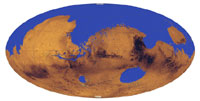 Mars was once a water world, concludes a new study that dives into the controversy over whether an ocean covered much of the Red Planet’s northern hemisphere early in its history.
Mars was once a water world, concludes a new study that dives into the controversy over whether an ocean covered much of the Red Planet’s northern hemisphere early in its history.
Ever since researchers found hints in the late 1980s that Mars’ northern lowlands are ringed by what appears to be a dried-up shoreline, planetary scientists have debated whether the region was covered by water about 3.5 billion years ago. Now, Gaetano Di Achille and Brian Hynek of the
Saturn, Mars and Venus line up in June sky (10/06/2010)
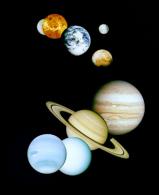 As darkness falls at the beginning of June, three planets will form a long line in the western sky. Saturn will be at the upper left, Mars in the middle and Venus at the lower right. Venus will form a straight line with the bright stars Pollux and Castor of the constellation Gemini the Twins on June 11 fairly low in the west-northwest. On June 19 and 20, the brilliant white planet will pass just north of the Beehive star cluster. Binoculars will show the stars twinkling while the planet gleams steadily.
As darkness falls at the beginning of June, three planets will form a long line in the western sky. Saturn will be at the upper left, Mars in the middle and Venus at the lower right. Venus will form a straight line with the bright stars Pollux and Castor of the constellation Gemini the Twins on June 11 fairly low in the west-northwest. On June 19 and 20, the brilliant white planet will pass just north of the Beehive star cluster. Binoculars will show the stars twinkling while the planet gleams steadily.
To Venus's upper left (south) will be red-orange Mars, making a colorful contrast with nearby blue-white Regulus, the brightest star of the constellation Leo the Lion. The colors will appear most vivid through binoculars. Mars and Regulus will be closest on June 6, but they will remain near each other for the first half of the month.
Could Life Survive on Mars? Yes, Expert Says (09/06/2010)
 Researchers at McGill's department of natural resources, the National Research Council of Canada, the University of Toronto and the SETI Institute have discovered that methane-eating bacteria survive in a highly unique spring located on Axel Heiberg Island in Canada's extreme North. Dr. Lyle Whyte, McGill University microbiologist explains that the Lost Hammer spring supports microbial life, that the spring is similar to possible past or present springs on Mars, and that therefore they too could support life.
Researchers at McGill's department of natural resources, the National Research Council of Canada, the University of Toronto and the SETI Institute have discovered that methane-eating bacteria survive in a highly unique spring located on Axel Heiberg Island in Canada's extreme North. Dr. Lyle Whyte, McGill University microbiologist explains that the Lost Hammer spring supports microbial life, that the spring is similar to possible past or present springs on Mars, and that therefore they too could support life.









